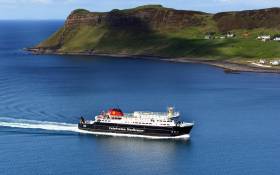Displaying items by tag: CalMac Awarded 8 Year Contract
CalMac Welcomes Tender Award Contract Up to 8-Years
#TenderAward - One of Europe's leading transport operators, CalMac has welcomed Transport Scotland's decision to award it the Clyde and Hebrides Ferry Services (CHFS) contract for up to eight years. This sees the services remain in public hands through CalMac's ferry network operations.
Martin Dorchester, Managing Director of CalMac said: "We are proud to be given the opportunity to transform ferry passengers' experience across the west coast of Scotland and to work closely with our partners to connect towns, cities and communities like never before.
"Our successful bid demonstrates our ability to provide innovative service improvements and value for money for customers. Drawing on our experience in the UK ferry market where we have won a number of awards, our bid delivers industry-leading customer care and high standards of reliability.
"The detail of our bid is confidential until the formal procurement process is concluded, however among the things that people can look forward to seeing are more opportunities for local employment; a refreshed on-board retail offering; investment in on-board facilities; closer, more responsive working with communities and an innovative approach to vessel maintenance to minimise disruption to services especially during the winter refit period.
"Our commitment to safety, support for local economies and businesses and protecting the very special environment in which we operate will not change."
He added: "I would also like to take this opportunity to thank the many people across our network and further afield for their support during this testing time for everyone associated with CalMac and especially our staff ashore and at sea, whose efforts over the last nine years have been acknowledged and rewarded with this contract.
"Now the hard work begins in delivering this contract during challenging economic times."
David McGibbon, Chairman of CalMac, said: "This is great news for the staff, the company and the communities we support up and down the west coast of Scotland.
"A huge amount of time and effort has gone into understanding the aspirations of these communities for these vital services and preparing a bid which reflect these and our own ambitions.
"I am delighted to see this hard work has been rewarded with this prestigious contract."





























































